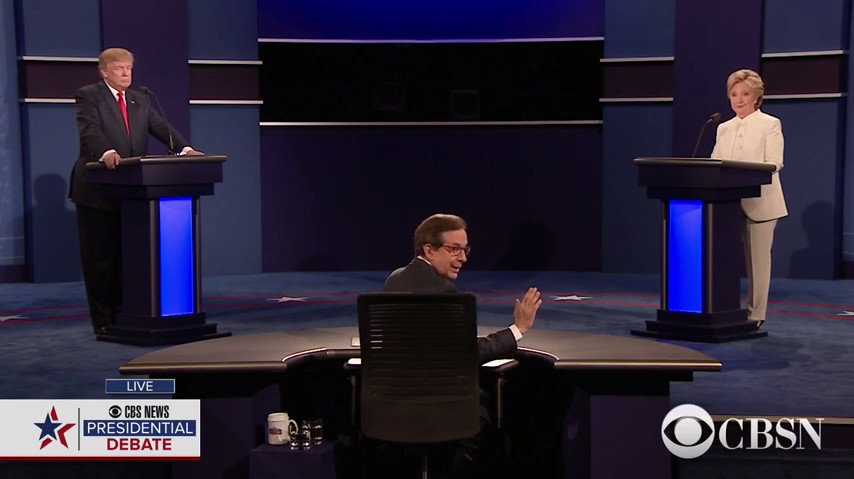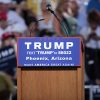
The most acrimonious presidential election in US history –the Jefferson-Adams election and Lincoln’s first in 1860 being possible exceptions– has now entered the home stretch. Hillary Clinton, the candidate of the Democratic Party, appears to have pulled out of the final turn of the long campaign well before, and at a faster rate than, her political opponent, Donald Trump, the odd bearer of the Republican Party standard.
Even before last night’s seemingly determining debate, statistical analysis of the evolution of the polls during past elections revealed that a Trump victory, given where he stood in the polls at the beginning of this week (down 5.7 percentage points last Saturday, October 16) and how little time remained before the election, would be historically unprecedented. In other words, no presidential candidate ever before had experienced such a significant swing in the intended vote in such a short period of time as the kind that Trump would have to experience in order to win.
The debate was generally more subdued than its predecessors, at least at out the gates, up the straight, and into the first curve. This was primarily due to two factors: first, the moderator, Chris Wallace from Fox News, wisely began with questions tightly focused on policies; second, Trump appeared to be following at least one chorus of voices trying to advise him –attempting to contain himself, to appear calm and confident, determined but unflappable. Therefore, at least for a while, the debate hewed remarkably to issues (the future of the Supreme Court, the Second Amendment and gun regulation, and abortion). And, at least for a while, Trump appeared to be neck and neck with Clinton –at least within the controlled experiment of a debate.
But the fate of the subsequent straightaway is so very often determined by what happens during the turn, along the curve. At the very moment when the ‘just look presidential’ school among Trump supporters must have felt their hopes arising, Clinton began to pepper her answers with large pieces of bait for the big fish who “should have won a grammy” for his reality show, The Apprentice.
This was evident when Chris Wallace asked Trump about the nine (or so) women (so far) to have recently accused him of what are now considered illegal sexual assaults. To be fair to Wallace, and to everyone else, the moderator also included in same question the request that Clinton also clarify her position on, and role in relation to, her husband’s infidelities in the White House. In the exchange that followed, Trump denied having committed any such acts, calling the women liars seeking “their 10 minutes of fame.” But then Clinton pointed out that Trump had been trying to deflect the issue by implying that the women were too unattractive for him to have even considered the idea of touching them. The escape route that Trump went for was to insist that he had not even apologized to his wife because he “didn’t do anything,” as if that were clear evidence in his favor.
The most reported line of the night was Trump’s response as to whether he would respect the election result, should he lose: “I will look at it at the time,” he said, only hesitating briefly. When Chris Wallace pressed him, as if to politely remind Trump of one of the most sacred bedrock principles of the great American democratic republic –that of accepting the peaceful alternation of government power when called for by the voice of the people– Trump not only repeated himself (“I will look at it at time.”) but he also added: “I will keep you in suspense. OK?”
The best line of the night, however, came from Chris Wallace himself. Once the comic version of Trump (meaning the one doing his flailing best to appear well-behaved) gave way to the tragic version (meaning the pathetic victim of his own dramatic irony), he began to interrupt not only Clinton, but also the moderator. At one point, he seized the floor from Clinton; but when Wallace attempted to appeal to his respect for the rules of fair debate, Trump barreled over him. Wallace took wise and brave advantage of the very next moment in which Trump took time to inhale to interject: “Mister Trump, I am not a potted plant. I do get to ask the questions.” In a back-handed way, the episode revealed that Donald Trump might not only have the still widespread male habit of objectifying women, but that indeed, he has a tendency to objectify nearly everyone.
Indeed, of the three Americans involved, Wallace came out the relative giant of the night. He crafted and executed his role as moderator in an admirable way. He asked the questions that needed to be asked. He pressed each of the candidates on their respective, controversial policies (both domestic and international), he probed questionable aspects of their records, and he attempted to allow the crucial aspects of character and leadership capacity to be revealed. He wielded his privileged authority to be the neutral and fair arbiter of what could easily be one of the most important political debates in recent history. Many would probably agree that not only did he represent Fox News better than anyone ever has but also that he conjured up the notion, as if by some magic of integrity, of the America of our parents and grandparents.
In any event, since the debate last night the betting odds have ticked up two percentage points in Clinton’s favor (from 84% to 86%) and she leads in the average of the national polls by six percentage points. This translates state by state into a 90 vote lead in the electoral college, only 10 votes short of victory and with nearly all of the toss up states leaning to her. Now Clinton is pulling away and Trump is flailing in her wake.


